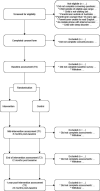Protocol for the Let's Grow randomised controlled trial: examining efficacy, cost-effectiveness and scalability of a m-Health intervention for movement behaviours in toddlers
- PMID: 35351726
- PMCID: PMC8961153
- DOI: 10.1136/bmjopen-2021-057521
Protocol for the Let's Grow randomised controlled trial: examining efficacy, cost-effectiveness and scalability of a m-Health intervention for movement behaviours in toddlers
Abstract
Introduction: Despite being an important period for the development of movement behaviours (physical activity, sedentary behaviour and sleep), few interventions commencing prior to preschool have been trialled. The primary aim of this trial is to assess the 12-month efficacy of the Let's Grow mHealth intervention, designed to improve the composition of movement behaviours in children from 2 years of age. Let's Grow is novel in considering composition of movement behaviours as the primary outcome, using non-linear dynamical approaches for intervention delivery, and incorporating planning for real-world implementation and scale-up from its inception.
Methods and analysis: A randomised controlled trial will test the effects of the 12-month parental support mHealth intervention, Let's Grow, compared with a control group that will receive usual care plus electronic newsletters on unrelated topics for cohort retention. Let's Grow will be delivered via a purpose-designed mobile web application with linked SMS notifications. Intervention content includes general and movement-behaviour specific parenting advice and incorporates established behaviour change techniques. Intervention adherence will be monitored by app usage data. Data will be collected from participants using 24-hour monitoring of movement behaviours and parent report at baseline (T0), mid-intervention (T1; 6 months post baseline), at intervention conclusion (T2; 12 months post baseline) and 1-year post intervention (T3; 2 years post baseline). The trial aims to recruit 1100 families from across Australia during 2021. In addition to assessment of efficacy, an economic evaluation and prospective scalability evaluation will be conducted.
Ethics and dissemination: The study was approved by the Deakin University Human Ethics Committee (2020-077). Study findings will be disseminated through publication in peer-reviewed journals, presentation at scientific and professional conferences, and via social and traditional media.
Trial registration number: ACTRN12620001280998; U1111-1252-0599.
Keywords: Community child health; PREVENTIVE MEDICINE; PUBLIC HEALTH.
© Author(s) (or their employer(s)) 2022. Re-use permitted under CC BY-NC. No commercial re-use. See rights and permissions. Published by BMJ.
Conflict of interest statement
Competing interests: None declared.
Figures
Similar articles
-
Examining the efficacy of a multicomponent m-Health physical activity, diet and sleep intervention for weight loss in overweight and obese adults: randomised controlled trial protocol.BMJ Open. 2018 Oct 30;8(10):e026179. doi: 10.1136/bmjopen-2018-026179. BMJ Open. 2018. PMID: 30381313 Free PMC article.
-
Study protocol for Active Start Active Future: a randomised control trial of an early behaviour-change intervention targeting physical activity participation and sedentary behaviour in young children with cerebral palsy living in South East Queensland, Australia.BMJ Open. 2025 May 19;15(5):e087697. doi: 10.1136/bmjopen-2024-087697. BMJ Open. 2025. PMID: 40389315 Free PMC article.
-
Randomised controlled trial using a theory-based m-health intervention to improve physical activity and sleep health in adults: the Synergy Study protocol.BMJ Open. 2018 Feb 8;8(2):e018997. doi: 10.1136/bmjopen-2017-018997. BMJ Open. 2018. PMID: 29439005 Free PMC article. Clinical Trial.
-
How do mobile health applications support behaviour changes? A scoping review of mobile health applications relating to physical activity and eating behaviours.Public Health. 2019 Oct;175:8-18. doi: 10.1016/j.puhe.2019.06.011. Epub 2019 Jul 30. Public Health. 2019. PMID: 31374453
-
[From the intimate to the collective, multi-traumas are in process: Let's dare to prevent rather than cure, let's dare an ethical policy].Ethics Med Public Health. 2020 Jul-Sep;14:100538. doi: 10.1016/j.jemep.2020.100538. Epub 2020 May 29. Ethics Med Public Health. 2020. PMID: 32835056 Free PMC article. Review. French.
Cited by
-
Six-month intervention effect of a digital movement behavior intervention on parent- and child intermediary outcomes-results from the Let's Grow randomized controlled trial.Int J Behav Nutr Phys Act. 2025 Jun 16;22(1):78. doi: 10.1186/s12966-025-01764-1. Int J Behav Nutr Phys Act. 2025. PMID: 40524171 Free PMC article. Clinical Trial.
-
Effectiveness of a parent-focused intervention targeting 24-hour movement behaviours in preschool-aged children: a randomised controlled trial.Int J Behav Nutr Phys Act. 2024 Sep 9;21(1):98. doi: 10.1186/s12966-024-01650-2. Int J Behav Nutr Phys Act. 2024. PMID: 39252110 Free PMC article. Clinical Trial.
-
Parental and Demographic Predictors of Engagement in an mHealth Intervention: Observational Study From the Let's Grow Trial.JMIR Mhealth Uhealth. 2025 Jul 15;13:e60478. doi: 10.2196/60478. JMIR Mhealth Uhealth. 2025. PMID: 40664374 Free PMC article.
-
Tensions and Paradoxes of Scaling Up: A Critical Reflection on Physical Activity Promotion.Int J Environ Res Public Health. 2022 Nov 1;19(21):14284. doi: 10.3390/ijerph192114284. Int J Environ Res Public Health. 2022. PMID: 36361159 Free PMC article.
-
Systems approaches to scaling up: a systematic review and narrative synthesis of evidence for physical activity and other behavioural non-communicable disease risk factors.Int J Behav Nutr Phys Act. 2024 Mar 21;21(1):32. doi: 10.1186/s12966-024-01579-6. Int J Behav Nutr Phys Act. 2024. PMID: 38515118 Free PMC article.
References
-
- World Health Organization . Report of the Commission on ending childhood obesity, 2016. Available: https://www.who.int/publications/i/item/9789241510066
Publication types
MeSH terms
Associated data
LinkOut - more resources
Full Text Sources
Medical

